|
|
|
Sort Order |
|
|
|
Items / Page
|
|
|
|
|
|
|
| Srl | Item |
| 1 |
ID:
053730
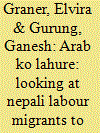

|
|
|
| 2 |
ID:
161590
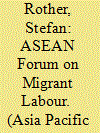

|
|
|
|
|
| Summary/Abstract |
The aim of this article is to discuss and substantiate new spaces for the political participation of migrant civil society at the regional level in Southeast Asia through the lens of the Association of Southeast Asian Nations (ASEAN) Forum on Migrant Labour (AFML). The AFML process is shaped by the International Labour Organisation and mirrors its tripartite format, essentially bringing together governments, employers’ and workers’ organisations. Crucially, migrant support and self‐organisations also have access, even if somewhat restricted, to regularly held deliberations. In light of the ASEAN consensus on migration that was agreed upon at the end of 2017, the article situates the AFML within the ongoing process of migration governance in the region and focusses especially on the role of migrant civil society as an important stakeholder. Based on the specific experience of civil society organisations (CSOs) from Malaysia, the article discusses which spaces the forum provides for civil society actors and how the latter use them for their advocacy. The major argument of the article is that the development of migration policies at the regional level can benefit from the inclusion of migrant civil society in the process. The governance of migrants could thus be complemented by governance for and by migrants.
|
|
|
|
|
|
|
|
|
|
|
|
|
|
|
|
| 3 |
ID:
132900
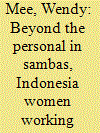

|
|
|
|
|
| Publication |
2014.
|
| Summary/Abstract |
Sambas, a regency in Indonesia's West Kalimantan Province, on the border with Sarawak (Malaysia), provides a distinctive borderlands perspective from which to evaluate the economic and social transformations that accompany Indonesian women's labor mobility. Drawing on village surveys and case studies about women's cross-border activities in Sambas, this article examines the complex inter- section between women's working lives and economic sectors, including those conventionally labeled formal, informal, subsistence, and capitalist. The increasing involvement of young Indonesian Malay women in labor migration has also fostered new marital and familial patterns, which may in turn generate further shifts within the organization of cross-border work and family in the future. These changes illuminate issues of agency and precedence that arise out of local economic histories and family patterns of labor and labor migration. This analysis of both continuities and transformations in women's cross-border labor leads us to attend to women's creative engagement with the opportunities and constraints they face in reaching their personal and economic aspirations. One opportunity, this study shows, was women's proximity to an international border. This location they turned into an economic asset, one that harnessed the productive power of the border.
|
|
|
|
|
|
|
|
|
|
|
|
|
|
|
|
| 4 |
ID:
088014
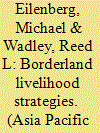

|
|
|
|
|
| Publication |
2009.
|
| Summary/Abstract |
This paper explores cross-border ethnic relations as an important socio-economic strategy for the borderland Iban population in West Kalimantan, Indonesia. Iban seeking more lucrative wage work have long used their ethnic identity to facilitate circular labour migration across the international border into Sarawak, Malaysia, a strategy which has also compromised their claims to Indonesian citizenship. Drawing on long-term field research among the West Kalimantan Iban, we examine the close interconnections among cross-border labour migration, ethnicity, identity, and citizenship, and how this plays into contemporary issues related to Indonesian political and economic change.
|
|
|
|
|
|
|
|
|
|
|
|
|
|
|
|
| 5 |
ID:
165964


|
|
|
|
|
| Summary/Abstract |
In the last two decades, mobile phones and new technologies have transformed migration. Some scholars argue that they help empower migrants, who are otherwise often marginalized in their host country. We discuss the extent to which this is true for Kyrgyz labour migrants in Russia, a relatively large diaspora that suffers from multiple levels of disempowerment, ranging from precarious living and working conditions to a lack of legal support and representation from their home government. Relying on fieldwork conducted in Kyrgyzstan in 2017 and 2018, we explore the extent to which smartphones are enabling Kyrgyz labour migrants in Russia to be informed about migration rules, help each other abroad, connect as a diaspora, and discuss important diaspora topics. Our findings are relevant beyond academia, as many international and governmental agencies are trying to assist migrants through technology; they also point to several missed opportunities for these organizations.
|
|
|
|
|
|
|
|
|
|
|
|
|
|
|
|
| 6 |
ID:
085994
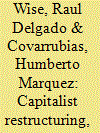

|
|
|
|
|
| Publication |
2008.
|
| Summary/Abstract |
The current dynamics of South to North migration flows can be explained by the nature of the ongoing process of capitalist restructuring, but in order to examine these issues we must approach them from the perspective of critical development studies. Mexican migration to the USA is paradigmatic of the regressive consequences of neoliberal structural adjustment policies and processes of regional integration based on access to cheap labour. From the lens of the political economy of development the dialectical relationship between development and migration can be analysed through three major movements: the dismantling and rearticulation of the productive apparatus, the creation of vast amounts of surplus population, well beyond the conventional formulation of the reserve army of the unemployed and the acceleration of migration flows. An examination of these issues leads us to conclude the following four facts: capitalist restructuring results in forced migration; immigrants contribute to capital accumulation in labour-receiving countries; migrants help sustain the fragile socioeconomic stability of the migrants' country of origin and, if used as a tool of social transformation, development can curtail forced migration.
|
|
|
|
|
|
|
|
|
|
|
|
|
|
|
|
| 7 |
ID:
142413
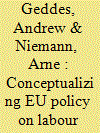

|
|
|
|
|
| Summary/Abstract |
This introduction sets the scene for the articles in this themed section. The starting point is the relatively recent but important developments that have occurred in the area of EU labour migration such as the 2009 ‘Blue Card’ directive covering highly qualified migrants, the 2011 single-permit directive covering residence and work, and a 2013 directive on seasonal workers. The article specifies the legal, policy and institutional developments in this area and discusses their significance. To facilitate reflection on the effects of these developments, the introduction focuses on underlying behavioural logics—that is, modes of action—that could account for the development of EU competencies and that then emerge as themes within the papers in this themed section. The first is an instrumental logic that focuses on the ways in which key actors pursue their interests.
|
|
|
|
|
|
|
|
|
|
|
|
|
|
|
|
| 8 |
ID:
128140
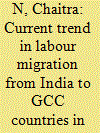

|
|
|
|
|
| Publication |
2014.
|
| Summary/Abstract |
Migration and movement of human population have always been an integral element in the history of mankind. India has been experiencing large-scale migration to foreign countries since centuries and in the current globalised era. The International Labour Organization - ILO has classified international migration for employment in to two major categories including settlement migration and contract migration (ILO, 1989). The contract migration is unique phenomenon practiced in few western countries but in particular in the GCC countries post oil boon during 1970's as the governments used sharply higher oil revenue to build infrastructure and housing, and expand the economy (Seccombe, 1985).
|
|
|
|
|
|
|
|
|
|
|
|
|
|
|
|
| 9 |
ID:
166685
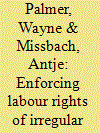

|
|
|
|
|
| Summary/Abstract |
The multi-directional nature of labour migration flows has resulted in an increasing number of countries having become both senders and receivers of regular and irregular migrants. However, some countries continue to see themselves primarily as senders and so ignore their role as a receiving country, which can have negative implications for the rights of migrants in their territory. Using the example of Indonesia, which is State Party to the 1990 UN Convention on the Rights of All Migrant Workers and Their Families, this article demonstrates that irregular migrant workers in this country have the legal right to protection against labour exploitation even when they work despite the government’s prohibition on employment. The article discusses the ‘right to work’ and how international human rights law has translated it into the ‘right to protection from labour exploitation’ for irregular migrants in Indonesia. By way of two case studies about the Indonesian government’s handling of irregular migrants, it shows how it prioritises enforcement of the employment immigration law over labour and employment laws much like countries that have not ratified the ICRMW. It also draws attention to legal protection gaps that emerge for asylum seekers when they are recognised to be genuine refugees.
|
|
|
|
|
|
|
|
|
|
|
|
|
|
|
|
| 10 |
ID:
173204
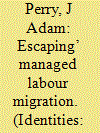

|
|
|
|
|
| Summary/Abstract |
This article narrows in on the mundane yet extraordinary events surrounding migrant farm workers’ decisions to leave their state-approved employment and to seek a better life in Canada outside of state-managed circulatory labour migration. In so doing, this research contributes to conceptualisations of precarity, and of precarious status in particular, that are beginning to recognise its effects not only on workers’ economic survival, but also the more ordinary daily conditions surrounding workers’ sense belonging and personal autonomy. In their refusal to accept the terms of their contractual circulatory labour migration agreements through what is conceptualised here as an act of ‘escape’, workers claim a space of belonging that contradicts the precarity of their formal citizenship status. In carving out a space in which they may perform autonomy and self-determination in daily life, however, this rejection of contingent citizenship status intensifies the precarious material conditions governing workers’ relationship to the state.
|
|
|
|
|
|
|
|
|
|
|
|
|
|
|
|
| 11 |
ID:
142415
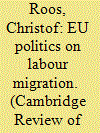

|
|
|
|
|
| Summary/Abstract |
Two European Union (EU) directives on labour migration were adopted in 2009 and 2011. The EU scheme to attract highly qualified migrants, the so-called ‘Blue Card’ directive of 2009, allows member states broad flexibility in implementation. In contrast, the directive on a single permit for migrant workers and their rights of 2011 is far less flexible. It does significantly reduce the scope for derogations at a national level to a minimum. How can this variance in output be explained? Institutional rules are shown to be a key factor. The involvement of the European Parliament as co-legislator alongside the Council limited member states’ influence on legal outputs. The comparison of policy outputs between the two cases points to differences in actor orientations: rather than seeking to increase labour migration into the EU by defining expansive admission conditions, the common EU policy seeks to include migrant workers by defining their rights.
|
|
|
|
|
|
|
|
|
|
|
|
|
|
|
|
| 12 |
ID:
085621
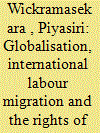

|
|
|
|
|
| Publication |
2008.
|
| Summary/Abstract |
The aim of the paper is to highlight the gaps between policy and practice in the current discourse on international migration and its links with development. It contends that a major cause of the limited development impact of migration is the 'closed door policy' of major destination countries on the admission of low-skilled migrant workers from developing countries. The paper addresses the weak foundations and major consequences of this policy: the denial of labour demand, channelling a large part of flows to irregular migration, consequent exploitation and violation of rights of migrant workers, and accelerated brain drain from developing countries. While there is increasing emphasis on temporary migration policies and programmes for low skilled labour, achievements on the ground have been quite limited. The movement towards a global migration regime which can address current pressing issues has also not progressed beyond broad consultative forums. There is an imperative need for fresh approaches and bold initiatives to promote international labour mobility for the welfare of the global community
|
|
|
|
|
|
|
|
|
|
|
|
|
|
|
|
| 13 |
ID:
085985
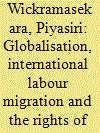

|
|
|
|
|
| Publication |
2008.
|
| Summary/Abstract |
The aim of the paper is to highlight the gaps between policy and practice in the current discourse on international migration and its links with development. It contends that a major cause of the limited development impact of migration is the 'closed door policy' of major destination countries on the admission of low-skilled migrant workers from developing countries. The paper addresses the weak foundations and major consequences of this policy: the denial of labour demand, channelling a large part of flows to irregular migration, consequent exploitation and violation of rights of migrant workers, and accelerated brain drain from developing countries. While there is increasing emphasis on temporary migration policies and programmes for low skilled labour, achievements on the ground have been quite limited. The movement towards a global migration regime which can address current pressing issues has also not progressed beyond broad consultative forums. There is an imperative need for fresh approaches and bold initiatives to promote international labour mobility for the welfare of the global community.
|
|
|
|
|
|
|
|
|
|
|
|
|
|
|
|
| 14 |
ID:
116072


|
|
|
|
|
| Publication |
2012.
|
| Summary/Abstract |
This article addresses temporary labour migration - known in Russian as otkhodnichestvo (going away on foot) - from the Russian republic of Dagestan. The discussion is situated within reviews of current work on migration in the former Soviet Union, push-pull factors determining migration behaviour in the North Caucasus, and the historical importance of otkhodnichestvo in imperial Russia and the USSR. The paper then turns to the results of a census conducted in summer 2006, which found that most migrants come from Dagestan's mountainous southwest, frequently obtain work at locations characterized by economic growth and high pay, and rely on ethnic or communal networks as a basis for choosing employment sector and destination when searching for work.
|
|
|
|
|
|
|
|
|
|
|
|
|
|
|
|
| 15 |
ID:
091896
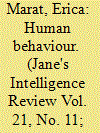

|
|
|
|
|
| Publication |
2009.
|
| Summary/Abstract |
Economic hardship and porous borders have contributed to the rise in human trafficking in Central Asia, but there is no significant cross-border cooperation to crack down on the trade. Erica Marat examines why some governments are keener to address the issue that others.
|
|
|
|
|
|
|
|
|
|
|
|
|
|
|
|
| 16 |
ID:
120154
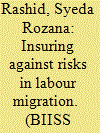

|
|
|
| 17 |
ID:
134372
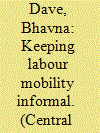

|
|
|
|
|
| Summary/Abstract |
Kazakhstan's legal–regulatory framework provides for a small number of quotas for highly skilled foreign workers but has no provisions for legal employment of semi-skilled or low-skilled migrants from the Central Asian states, who enter under the Commonwealth of Independent States (CIS) visa-free regime and work informally in construction, household and service sectors. The lack of acknowledgement of the scale of informal labour migration has denoted an act of strategic neglect on the part of the state, allowing it to render migrant labour illegal, disposable, and keep migrants legally and statistically invisible. Unable to obtain a legal status, migrants nominally comply with the existing legal framework as they also circumvent and subvert it. The article details the entrenched informal regime of labour migration and explains why recent efforts to ‘legalize’ labour through the introduction of a labour patent (licence), as is the case in Russia, are unlikely to bring in significant reforms.
|
|
|
|
|
|
|
|
|
|
|
|
|
|
|
|
| 18 |
ID:
147275
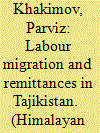

|
|
|
| 19 |
ID:
120206
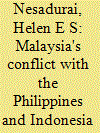

|
|
|
|
|
| Publication |
2013.
|
| Summary/Abstract |
If labour migration increases the potential for interstate conflicts, does the economic interdependence thus created make such conflicts easier to address, given the economic gains to both sides from such labour movements? This article addresses this question by using the concepts of economic security and interdependence to compare the Malaysia-Philippines and Malaysia-Indonesia conflicts over labour migration. Although the limited cases make generalizations difficult, the analysis suggests that the economic interdependence constraint on conflict escalation may not always work well as it may be offset by national security concerns in the labour receiving states about the illegal migrant workers and by the shifting economic underpinnings of economic security. The theoretically pacifying effect of interdependence can also be weakened by preventing the 'aggrieved country' from articulating clearer demands from the other side for fear of jeopardizing the economic gains from the migrant outflows. Comparing the two conflicts suggests that clearly articulated demands matched by effective state capacity in translating those demands into actions on the ground can help in conflict management. The potential for the migrant worker issue to evoke deep emotions and the ease with which that can translate into nationalist outpourings mean that both sending and receiving countries must develop bilateral or regional frameworks that outline clear best practice standards for the treatment of migrant workers, including during detention and repatriation.
|
|
|
|
|
|
|
|
|
|
|
|
|
|
|
|
| 20 |
ID:
147644
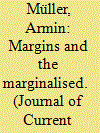

|
|
|
|
|
|
|
|